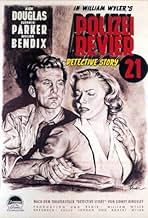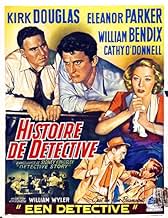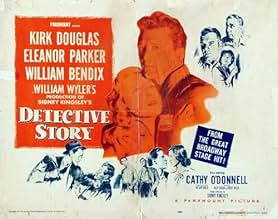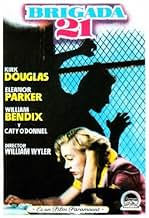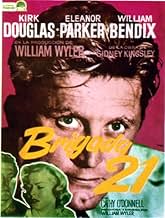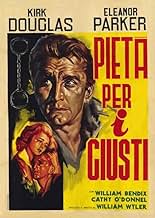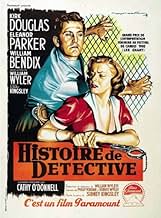AVALIAÇÃO DA IMDb
7,5/10
10 mil
SUA AVALIAÇÃO
Em um dia, na sala do esquadrão da 21ª Delegacia, diversos personagens formam o pano de fundo para os problemas do obstinado detetive Jim McLeod.Em um dia, na sala do esquadrão da 21ª Delegacia, diversos personagens formam o pano de fundo para os problemas do obstinado detetive Jim McLeod.Em um dia, na sala do esquadrão da 21ª Delegacia, diversos personagens formam o pano de fundo para os problemas do obstinado detetive Jim McLeod.
- Direção
- Roteiristas
- Artistas
- Indicado a 4 Oscars
- 7 vitórias e 11 indicações no total
William 'Bill' Phillips
- Det. Pat Callahan
- (as William 'Bill' Phillips)
- Direção
- Roteiristas
- Elenco e equipe completos
- Produção, bilheteria e muito mais no IMDbPro
Avaliações em destaque
William Wyler, who won three Oscars for Best Director ("Mrs. Miniver", "The Best Years of Our Lives", "Ben-Hur"), and been nominated a record 12 times between 1937 and 1966, is not often thought of as one of our "great" directors. Truly, he was. Here, with the filmization of Sidney Kingsley's stage play about a NYC police station, focusing on the amazingly bad day which has been happening to Detective Kirk Douglas, Wyler shows his skill and diversity.
Kirk Douglas is the vision of a crumbling spirit disguised by toughness and authority. He towers over a stellar cast, including Eleanor Parker as his wife, William Bendix as one of the other officers in the precinct, and Lee Grant as an inexperienced shoplifter. The one actor who truly stands out from the rest is Joseph Wiseman, who is simply a spark plug made up as an actor, giving an astounding recreation of his stage role as an on-edge, cheap suit-wearing thief. He displays the physical dexterity of James Cagney in the physique of a beanstalk, and proves to be more dangerous than any other movie crook we'd seen in the past.
In one of the great Oscar follies of our time (and there were many), the 1952 voters neglected to nominate Douglas as Best Actor, or Wiseman in a supporting slot. Nominations were given out for Wyler's direction, the screenplay, and for Parker and Grant, lead and supporting actresses respectively. None for Best Picture, the other nominations were passed over in favor of "A Place in the Sun" and "A Streetcar Named Desire". And who was picked for Best Picture? Well, staying true to AMPAS's mission of picking only the most harmless movie of the year ("Driving Miss Daisy", "Chariots of Fire", "Shakespeare in Love"), instead of the best, they picked "An American in Paris", which will be remembered by film historians as merely a rehearsal for "Singin' in the Rain". Oh, well.
Kirk Douglas is the vision of a crumbling spirit disguised by toughness and authority. He towers over a stellar cast, including Eleanor Parker as his wife, William Bendix as one of the other officers in the precinct, and Lee Grant as an inexperienced shoplifter. The one actor who truly stands out from the rest is Joseph Wiseman, who is simply a spark plug made up as an actor, giving an astounding recreation of his stage role as an on-edge, cheap suit-wearing thief. He displays the physical dexterity of James Cagney in the physique of a beanstalk, and proves to be more dangerous than any other movie crook we'd seen in the past.
In one of the great Oscar follies of our time (and there were many), the 1952 voters neglected to nominate Douglas as Best Actor, or Wiseman in a supporting slot. Nominations were given out for Wyler's direction, the screenplay, and for Parker and Grant, lead and supporting actresses respectively. None for Best Picture, the other nominations were passed over in favor of "A Place in the Sun" and "A Streetcar Named Desire". And who was picked for Best Picture? Well, staying true to AMPAS's mission of picking only the most harmless movie of the year ("Driving Miss Daisy", "Chariots of Fire", "Shakespeare in Love"), instead of the best, they picked "An American in Paris", which will be remembered by film historians as merely a rehearsal for "Singin' in the Rain". Oh, well.
In one day in the 21st Precinct of New York, many criminals are booked after being arrested: a shoplifter is brought after stealing a purse in a department store; two burglars with extensive criminal record are captured by a policeman burgling an apartment; the small time embezzler Arthur Kindred (Craig Hill), who is primary, is arrested without any resistance. The tough Detective McLeod (Kirk Douglas), who loves his wife Mary (Eleanor Parker), is an honest detective with strong principles and code of honor and zero tolerance. He is near to conclude a case against an abortionist, Dr. Karl Schneider (George Macready), with the testimony of a witness that is coming to identify Dr. Schneider in the precinct. However, the woman is bribed and the upset McLeod hits Schneider, and he insinuates to McLeod's chief, Lt. Monaghan (Horace McMahon), that the problem is personal and gives the name of Mary McLeod. Lt. Monaghan invites Mary to come to his office for investigation, when deep innermost secrets of her past are disclosed leading to a tragedy.
"Detective Story" is amazingly intense and full of emotions in spite of being shot practically in only one scenario in the interior of the precinct. Kirk Douglas gives an outstanding performance, developing a complex character that sees his principles destroyed in a couple of hours with a great intensity. Eleanor Parker is also fantastic, in the dramatic and heartbreaking role of Mary McLeod. The direction of William Wyler is perfect as usual. My vote is eight.
Title (Brazil): "Chaga de Fogo" ("Sore of Fire")
"Detective Story" is amazingly intense and full of emotions in spite of being shot practically in only one scenario in the interior of the precinct. Kirk Douglas gives an outstanding performance, developing a complex character that sees his principles destroyed in a couple of hours with a great intensity. Eleanor Parker is also fantastic, in the dramatic and heartbreaking role of Mary McLeod. The direction of William Wyler is perfect as usual. My vote is eight.
Title (Brazil): "Chaga de Fogo" ("Sore of Fire")
A play which tells the story of a day in the lives of the several people who populate a police precinct translates more or less transparently between mediums, though with its theatrical pace results in a vigorous, enthralling drama with a solid, receptive cast. Kirk Douglas, playing the central cop, a brooding maverick who can't stand having to stop at the line between law and vengeance, is very intense in particular, the breadth of view of a crystallizing soul masqueraded by rigor and command, which makes for some delicate scenes with his wife, Eleanor Parker. The very natural William Bendix is one of the other officers in the precinct, a cop with a delicate sensibility, the clear contrast to the uncompromising protagonist. But the film's brightest highlights are the few moments dominated by the brilliant Lee Grant, whose character seems non-sequitary yet has a refreshing outside-world quality. Dense with lively exhibitions of the sort of devil-may-care influx that transits and languishes through a workday of plainclothes detectives, it is a police procedural not in the traditional sense. There is no central case over which our detectives toil. There is simply an allotment of arrests and conflicting views on the confines of police work.
While this Edgar-winning cop drama stays in effect a filmed play, William Wyler uses the innate limitations of such a project as a creative outlet, as well as his widely known grating approach multiple retakes. The cooped up setting is not just a space where all manner of characters eyeball each other and interplay. It complements the lurking gist of the story's thematic elements and overall to the film's dramatic impact. The staging of the individual scenes, which a lot of the time plays on foreground-background relationships, is intensified by Lee Garmes's deep-focus cinematography, a consistent device used by Wyler throughout his body of work no matter how much he diversifies in genre and tone.
The core of Wyler's consistency throughout his tremendous career is his insistence on emotional truth, thus his enraging approach to directing actors, and thus his track record with directing Oscar-nominated and Oscar-winning performances. Wyler's discretion of angle exposes or intimates more character than the last and apprehends the decisive sensibility to give significance to the experience of seeing the film. He didn't coin anything new. He didn't use unprecedented angles or logistically fussy dolly takes. He's discerning from the acknowledged bill of fare of long shot, medium shot and close-up as the atmosphere of the scene calls for.
While this Edgar-winning cop drama stays in effect a filmed play, William Wyler uses the innate limitations of such a project as a creative outlet, as well as his widely known grating approach multiple retakes. The cooped up setting is not just a space where all manner of characters eyeball each other and interplay. It complements the lurking gist of the story's thematic elements and overall to the film's dramatic impact. The staging of the individual scenes, which a lot of the time plays on foreground-background relationships, is intensified by Lee Garmes's deep-focus cinematography, a consistent device used by Wyler throughout his body of work no matter how much he diversifies in genre and tone.
The core of Wyler's consistency throughout his tremendous career is his insistence on emotional truth, thus his enraging approach to directing actors, and thus his track record with directing Oscar-nominated and Oscar-winning performances. Wyler's discretion of angle exposes or intimates more character than the last and apprehends the decisive sensibility to give significance to the experience of seeing the film. He didn't coin anything new. He didn't use unprecedented angles or logistically fussy dolly takes. He's discerning from the acknowledged bill of fare of long shot, medium shot and close-up as the atmosphere of the scene calls for.
An assortment of detectives and an assortment of criminals, all gathered together under the oppressive 21st Precint roof. It's a day that nobody present will ever forget - for better or worse...
Directed by William Wyler (Best years Of Our Lives, Ben-Hur & Wuthering Heights) and starring Kirk Douglas, Eleanor Parker, William Bendix, Cathy O'Donnell and Joseph Wiseman.
Detective Story is based on the smash hit Broadway play by Sidney Kingsley, adapted by Phillip Yordan and Robert Wyler, it's with much relief to me that the worry of it being a stagy production never actually materialises. Practically set on one bleak, but quite excellently appropriate set (creation courtesy of Hal Pereira & Earl Hedrick), Detective Story manages to rise above the very simple plot by boasting interesting characters in a pot boiling story just waiting to reach its peak. Each character has much to offer the film, be it oddly quirky or overtly intense, within the confines of this particular precinct, the characters create engrossing drama.
It's a difficult film to sell without giving too much away, by outlaying the character persona's and mental fortitude's, I personally feel that it will dull the impact of this influential crime genre piece. It's got real raw emotive acting, particularly from Kirk Douglas as Jim McLeod and Eleanor Parker as his wife Mary, while the technical aspects (watch Lee Garmes' camera glide like a third party witness) are impressively high. And with it embracing as it does, morality themes, it also doesn't lack for interest to the cranial head scratching crowd.
It's by definition to me an all encompassing picture, one that is now sure to be a perennial viewing in my home. It's not a standard crime picture, and it most definitely is a talky film, but this works incredibly well, so one can only hope that many others will feel the same as myself, in that namely that it is indeed a fine and essential genre piece. 8/10
Directed by William Wyler (Best years Of Our Lives, Ben-Hur & Wuthering Heights) and starring Kirk Douglas, Eleanor Parker, William Bendix, Cathy O'Donnell and Joseph Wiseman.
Detective Story is based on the smash hit Broadway play by Sidney Kingsley, adapted by Phillip Yordan and Robert Wyler, it's with much relief to me that the worry of it being a stagy production never actually materialises. Practically set on one bleak, but quite excellently appropriate set (creation courtesy of Hal Pereira & Earl Hedrick), Detective Story manages to rise above the very simple plot by boasting interesting characters in a pot boiling story just waiting to reach its peak. Each character has much to offer the film, be it oddly quirky or overtly intense, within the confines of this particular precinct, the characters create engrossing drama.
It's a difficult film to sell without giving too much away, by outlaying the character persona's and mental fortitude's, I personally feel that it will dull the impact of this influential crime genre piece. It's got real raw emotive acting, particularly from Kirk Douglas as Jim McLeod and Eleanor Parker as his wife Mary, while the technical aspects (watch Lee Garmes' camera glide like a third party witness) are impressively high. And with it embracing as it does, morality themes, it also doesn't lack for interest to the cranial head scratching crowd.
It's by definition to me an all encompassing picture, one that is now sure to be a perennial viewing in my home. It's not a standard crime picture, and it most definitely is a talky film, but this works incredibly well, so one can only hope that many others will feel the same as myself, in that namely that it is indeed a fine and essential genre piece. 8/10
Some films are so full of life they have to be seen again and again. I first saw this one in my early teens and loved it, despite difficulty in understanding it. Decades later I still love it, and always will. It has its flaws: everybody overacts (beautifully), as if on stage. The writing is a bit too well-structured, almost like clockwork, the characters are a bit too symbolic and easy to categorise. The comic relief kicks in just on schedule. The psychological diagnosis is too precise. And yet, this is one of the greatest films ever made. It has a sense of respect for the totality of life, and makes tragedy almost poetic. Fascinating though the plot may be, the essence of this film goes beyond plot. It's a symphony of cacophony. The playwright would have made a fine composer.
Você sabia?
- CuriosidadesFilm debut of Lee Grant who was nominated for an Oscar, before being blacklisted for refusing to testify against then-husband Arnold Manoff.
- Erros de gravaçãoIn some of the close-up shots of McLeod and Schneider in the back of the paddy wagon, McLeod's shadow can be faintly seen on the rear-projection screen showing the street behind them. (Other shadows can also be seen.)
- Citações
Detective James McLeod: I built my whole life on hating my father. All the time he was inside me, laughing.
- ConexõesFeatured in Paramount Presents (1974)
Principais escolhas
Faça login para avaliar e ver a lista de recomendações personalizadas
- How long is Detective Story?Fornecido pela Alexa
Detalhes
- Data de lançamento
- País de origem
- Idioma
- Também conhecido como
- Detective Story
- Locações de filme
- Empresa de produção
- Consulte mais créditos da empresa na IMDbPro
- Tempo de duração
- 1 h 43 min(103 min)
- Cor
- Proporção
- 1.37 : 1
Contribua para esta página
Sugerir uma alteração ou adicionar conteúdo ausente


